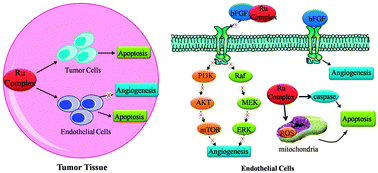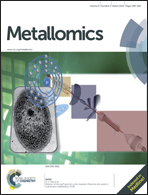Interaction between 8-hydroxyquinoline ruthenium(ii) complexes and basic fibroblast growth factors (bFGF): inhibiting angiogenesis and tumor growth through ERK and AKT signaling pathways†
Abstract
Angiogenesis is crucial for tumor growth. Thus, inhibiting angiogenesis represents a promising avenue for preventing tumor growth. This study investigated the anti-angiogenesis and anti-tumor effects of 8-hydroxyquinoline ruthenium(II) complexes [Ru(bpy)2(8-HQ)]+ (BQ) and [Ru(phen)2(8-HQ)]+ (PQ). The results showed that both compounds, especially PQ, suppressed the proliferation, migration, invasion, tube formation and microvessel growth of endothelial cells in vitro. PQ also inhibited tumor growth of human hepatocellular liver carcinoma cells (HepG2) in a mouse xenograft tumor model in vivo. To understand the mechanisms of how ruthenium(II) complexes disrupt bFGF-induced angiogenesis and tumor growth, we have shown that (1) both compounds can interfere with the binding of bFGF to its cell surface receptors, thereby suppressing activation of bFGF-mediated signaling cascades; (2) PQ can induce tumor cell apoptosis. These effects might inhibit angiogenesis and tumor cell proliferation in tumor tissue. Taken together, our findings reveal that 8-hydroxyquinoline ruthenium(II) complexes are specific inhibitors of bFGF-mediated angiogenesis, and may be a viable drug candidate in anti-angiogenesis and anti-tumor therapies.


 Please wait while we load your content...
Please wait while we load your content...